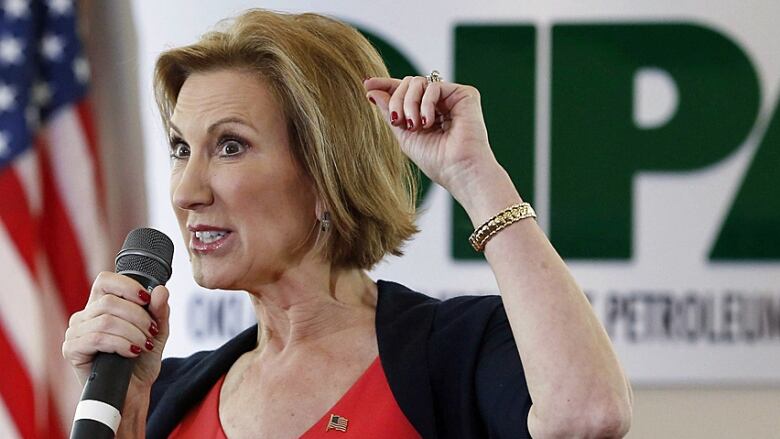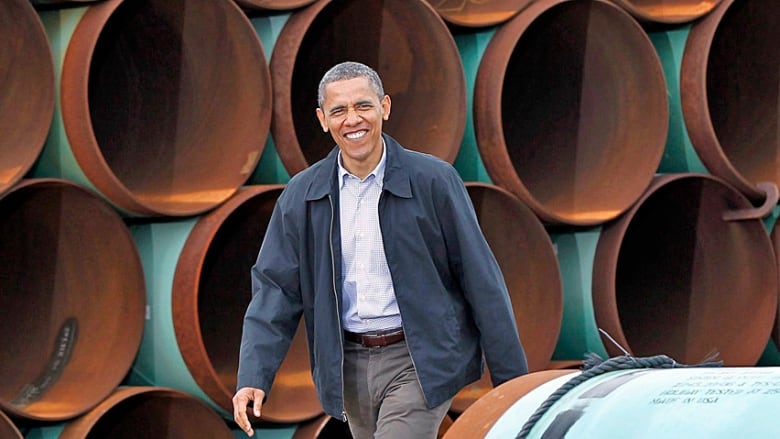Will Justin Trudeau take No for an answer on Keystone pipeline?
U.S. president likely to veto Keystone in run-up to big climate change conference next month

The Keystone XL pipeline still hasn't been approved. And U.S. President Barack Obama has hinted — widely, repeatedly, forcefully — that it may never be built.
And yet the proposed line that would connect Alberta's oil sands to the big refineries in Texas remains such a poster child for what's wrong with Canada-U.S. relations that mere rumours of a possible decision by the White House set tongues to wagging this week.
The Liberals' election win sparked this latest grind of the rumour mill. Reporters covering a clean energy conference in Washington, D.C., asked Secretary of State John Kerry if the defeat of Stephen Harper would affect the decision on whether to approve the pipeline.
"It will get done in its appropriate moment, but I would like to see it done as fast as possible," Kerry said. Asked if a decision was imminent, Kerry demurred, saying that was not "the word" he would use.
- How new voters tipped the scales for the Liberals
- Tories begin post-mortem as defeat sinks in
- Full election re-cap, political coverage
Even so, the Liberal's convincing election victory does provide Obama with an impetus to expedite his oft-delayed decision.
Keystone is — was — Stephen Harper's No. 1 bilateral issue. But it's not Trudeau's, even though the Liberal leader supports the pipeline.
With Trudeau's government set to be sworn in Nov. 4, a decision to reject the pipeline between now and then would be pinned, politically, on Harper's Conservatives.
The no-brainer
By now everyone old enough to pump gas into a car knows that the soon to be former PM and Conservative leader considered approval of the pipeline a "no-brainer." He said so. On American soil. To a largely American audience.
Harper also predicted it would be built even if Obama said no, as is now widely expected.
"I believe that whether this project goes ahead or not under this administration, it will ultimately go ahead under a subsequent administration," Harper told Bloomberg in an interview earlier this year.

That belief, of course, is hinged on a Republican settling into the Oval Office next year, as that party is much more onside.
The two leading contenders for the Democratic nomination — Hillary Clinton, Kerry's predecessor at the State Department, and Vermont Senator Bernie Sanders — would veto the project.
Harper's statement succeeded in curdling an already soured relationship with Obama.

And Trudeau knows that, which is why he's probably prepared to take No for an answer.
Changing climate
At his first news conference as prime minister-designate, Trudeau went beyond the usual platitudes and bromides released by governments to describe the private conversations between leaders to detail what he and Obama discussed during the president's congratulatory call on Tuesday.
"I indicated to Mr. Obama that I felt it was important that Canada demonstrates a level of positive engagement on the environmental file on the international stage.
"I look forward to demonstrating that we have a Canadian government now that understands the way to build a strong economy is to protect and defend our environment at the same time."
Obama made the fight against climate change a priority of his second term in office. Two years ago, his then ambassador to Canada, David Jacobson, told CBC's Power and Politics that Canada needed to show it was just as serious as the U.S. about reducing greenhouse gas emissions.
"Obviously there are things about our policies that have significant impact to Canada," Jacobson said then.
A single point of disagreement
That message, however, didn't seem to get through to Harper.
Though it apparently still registers with Trudeau, who would prefer relations between the two countries not be hinged on what he called "a single point of disagreement, a single pipeline."
Trudeau signalled this week that his government will take a different approach to energy and environmental issues.
"We need to ensure that we're working together on the things that we agree with and constructively on the issues where we may disagree," he said.
Which brings us back to the question of whether Obama might announce his decision in the next two weeks, before Trudeau takes over.

Jeffrey Phillips doesn't think so. He's the managing director of the consulting firm, Dawson Strategic, and a former senior policy adviser in the federal department of natural resources.
"Obama's decision," Phillips says, "won't be driven by a new Liberal government. It will be driven by his own domestic political needs.''
If that's the case, some analysts believe Obama is more likely to announce he's rejecting the pipeline in the leadup to the UN climate change conference in Paris, which begins Nov. 30.
That would help the president show other countries that the U.S. is both committed to reducing emissions, while burnishing his own legacy with environmentalists in the U.S. and abroad.
Still, whether Keystone XL gets the presidential go-ahead or not, Americans' appetite for oil, and exports from Canada, remains undiminished.
According to the U.S. Energy Information Administration, Canada's crude oil exports to the U.S. increased from 810 million barrels in 2010 to nearly 1.1 billion barrels in 2014.
And that, at least, will give Obama and Trudeau plenty to talk about.

